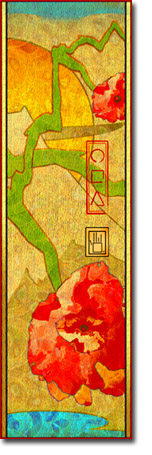On The Way: The Daily Zen Journal
On Cultivating the Mind
Chinul (1158-1210)
Confused Practice cannot Help
It is sad that people have been confused for so long. They do not understand that their own minds are Buddha, and that their own natures are Dharma. They look for Dharma by searching for sages for a way. They look for Buddha but do not observe their own minds.
If they aspire to Buddhahood while clinging to their opinion that Buddha is outside the mind and that Dharma is outside their own nature, then even if they burn their limbs and break their bones for a million kalpas to show their sincerity, even if they sit constantly and never lie down to sleep, write out sutras in their own blood, eat only one meal a day, and practice every austerity—it would be like trying to cook rice by boiling sand, and in the end they will only wear themselves out.
The Same Enlightenment for Sages and Ordinary Beings.
If you see the nature of your own mind, gates to the Dharma as countless as grains of sand in the Ganges will open, and limitless subtle meanings will make themselves known. The World-Honored One saw this and said, “Sentient beings everywhere are endowed with the wisdom and virtue of a Tathagata.”
And also, “The various illusory forms that sentient beings take all come from the Tathagata’s perfect enlightenment.” And so it is clear that Buddhahood cannot be attained apart from the mind.
All the Buddhas of the past were simply ordinary people who understood their minds. Likewise, all the masters of the present have simply cultivated their own minds. And all future practitioners will have to depend upon cultivation of mind. So if you wish to follow the Way, do not seek for it outside yourself.
The nature of mind is without blemish
It is originally whole and complete.
If you leave behind delusory karma
You will be Buddha just as you are.

The Only Thing is Within Us, But We Do Not See It
Student: If Buddha-nature is present now within the body, it is not separate from ordinary people. Then why can’t I see it? Would you please explain this more?
Chinul: It is present within your body; you just don’t see it. Who is it exactly who feels hungry and thirsty during the day, feels hot and cold, angry and happy? The body is a temporary compound of four elements: earth, water, fire, and wind. Matter itself is lifeless and insentient, so how can it see, hear, feel, and be conscious? But seeing, hearing, feeling, and being conscious are exactly your Buddha-nature. This is why Lin-chi said:
This corpse’s four elements
Cannot speak or hear Dharma.
Empty space
Cannot speak or hear Dharma.
Only the formless thing before your eyes,
Clear and bright of itself,
Can speak and hear Dharma.
This thing without any form is the Dharma-seal of all Buddhas. It is your original mind.
Chinul (1158-1210)
Excerpted from Zen Sourcebook: Traditional Documents from China, Korea, and Japan-Trans by Stanley Lombardo




“All the Buddhas of the past were simply ordinary people who understood their minds. Likewise, all the masters of the present have simply cultivated their own minds. And all future practitioners will have to depend upon cultivation of mind. So if you wish to follow the Way, do not seek for it outside yourself.”
Nothing much to grab onto here, not even instructions to meditate! However, we realize that a Zen master is teaching meditation; how else does one learn to turn the light around and look inside? Why else would one slow down enough to detach from the pull of the world around you? The many things/experiences/people around us offer compelling pulls outward into a very real sensory world.
“As you wander around looking for the Buddha outside your mind, a wise mentor might point out to you the entry point.”
What about the many who never encounter a wise mentor? It’s not exactly like we live in the Golden Age anymore. In olden times a student might go to many different teachers to get their understanding verified. So very different actions are called for in the times we find ourselves.
Even if we find a sangha to practice with, we are the ones who sit on the cushion; we are the ones who see ourselves in daily interactions; we are the ones who witness how we do the things we do from moment to moment. We can’t make our journey dependent on finding the right school or teacher to practice with. For many they will have to chart a course through these waters and learn as they go. This means also finding a way to follow the Way without fooling ourselves. No small feat here.
“Just get rid of the mind that clings to delusion and wants enlightenment.”
The teachings that have been recorded through the ages are a kind of road map that many will use as their primary directions to start out with, many will be confused by, and many others will persevere till, indeed, they break through. Just begin where you are and continue…
Traveling together,
Elana